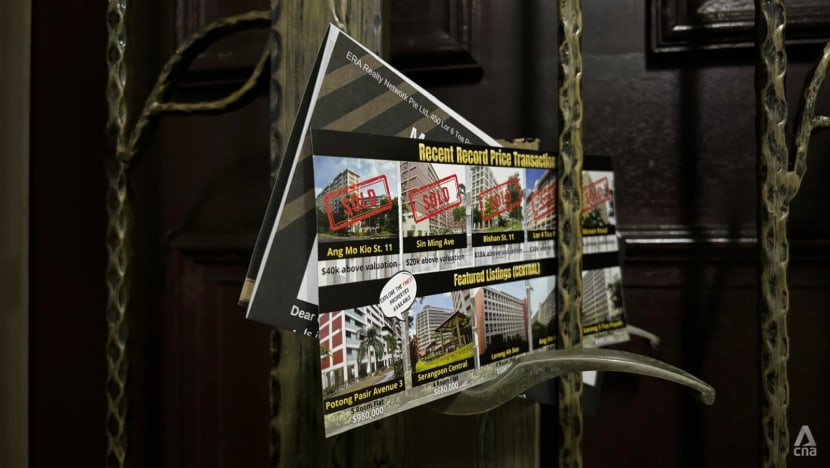Regulator mulling minimum transaction requirement for property agents to remain registered
The review by the Council for Estate Agencies comes after industry engagement sessions raised the risk posed by property agents who do not have regular transactions.

Fliers distributed by property agents left outside an HDB flat. (Photo: CNA/Tang See Kit)

This audio is generated by an AI tool.
SINGAPORE: The Council for Estate Agencies (CEA) is reviewing whether to require property agents to facilitate a minimum number of transactions to remain registered with the regulator.
In Singapore, property agents must pass an exam and be registered with the CEA through a licensed property agency before they can conduct any estate agency work. The registrations are renewed annually, with agents having to fulfil criteria such as clocking at least six hours of training.
Property agents currently do not have to meet a minimum number of transactions to renew their registrations.
The latest review by CEA comes after the “potential risk posed by property agents who do not facilitate transactions regularly” was raised during its industry engagement sessions.
The concern is that such inactive agents “may be less familiar with the evolving rules and regulations, property transaction processes and market trends, which could inadvertently affect the accuracy of advice provided to clients”, a CEA spokesperson told CNA.
The industry regulator said it acknowledges these concerns and is reviewing whether to introduce a requirement for property agents to "facilitate a minimum number of property transactions to renew their registration”.
“As part of the review, CEA is engaging industry stakeholders to assess the approach for such a requirement and explore how it can be implemented effectively,” the spokesperson added.
Singapore has seen a steady increase in the number of property agents in recent years. CEA has 35,251 property agents registered as of Jan 1, 2024.
The number of new agents has remained at just over 2,000 annually between 2021 and 2023. About 70 per cent of them were in their 30s and 40s.
Over the same period, an annual average of about 1,100 agents did not renew their registrations, CEA said.
On whether it tracks the number of inactive agents, the regulator said it currently only collects and publishes residential property transaction records of agents.
Based on its records for 2021 to 2023, an average of 40 per cent of agents did not complete at least one residential property transaction in a given year.
But these agents could still be facilitating commercial or industrial property transactions or in leadership roles supervising other agents, the CEA spokesperson said.
CAN BE DIFFICULT TO SET BLANKET STANDARD: AGENCIES
OrangeTee, the country’s fourth biggest property agency, considers those who have not completed a transaction in a year as inactive. About one-third of its agents fell under that category this year.
The other agencies that CNA approached did not provide figures, although Huttons Asia’s CEO Mark Yip reckoned that the number of inactive agents ranges from 30 to 50 per cent across the industry.
Industry players acknowledged that less active agents may fall short of keeping updated with the latest rules and market trends, which can affect their service levels.
Agents may not be actively closing deals due to various reasons. Some hold full-time jobs elsewhere or decide to take a break.
But others who remain in the industry include those with full-time roles in property agencies, developers and consultancies “where their expertise in this trade is crucial, but they may not be directly involved in sales”, said Orange Tee CEO Justin Quek.
Some agents who have taken on the role of team leaders may choose to focus on recruitment and mentoring newcomers instead.
“It is essential for agents to remain active and relevant in this industry,” said Mr Quek. “That said, the nature of real estate is influenced by seasonal and cyclical factors, as well as personal circumstances, which may impact transaction volumes in any given year.”
Transaction numbers represent “just one dimension of an agent's activity”, he added.
“While the idea of requiring a minimum number of transactions per year may signal a commitment to professionalism in the industry, it is important that such a policy be implemented thoughtfully, with careful consideration of its broader implications.”
Echoing that, Mr Yip said it may be “difficult to set a blanket standard” in terms of transaction numbers for the entire industry.
Industry players said they provide regular training and other forms of support to ensure their agents stay relevant.
They also made the point that current requirements are already weeding out agents who are not committed to their work.
For one, the mandatory examination for all new property agents “is not easy”, said ERA’s key executive officer Eugene Lim.
In addition, property agents will have to clock 16 hours of training a year, up from the current six to nine hours, before they can renew their registrations with the CEA. The new requirement kicks in from October next year, as part of CEA’s efforts to raise professional standards in the industry.
“We believe this increased (training) requirement will weed out quite a number of inactive agents who are not committed to the profession,” said Mr Lim.
“This will work together with the real estate salesperson exam, which they can always make it more difficult, to ensure that the industry will be served by agents that are qualified and committed.”















